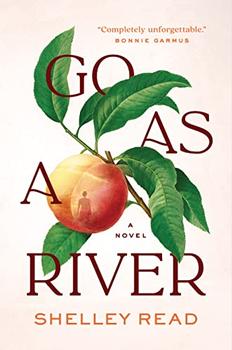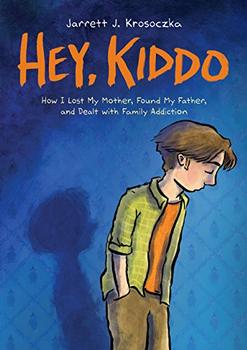Summary | Excerpt | Reviews | Beyond the book | Read-Alikes | Genres & Themes | Author Bio

It's too bad that Oprah's Book Club is now defunct, because Once Upon a River would make an ideal candidate for it. Whether this strikes you as an enticement or a deterrent depends on your enthusiasm for all-American pluck and grit in the face of obstacles thrown in with a dash of sex and a heap of tragedy, all in service to that glow of redemption waiting at the end. A cynic might claim that Campbell has meticulously crossed off each item on the Oprah-approved checklist: Self-reliant heroine navigating adolescence amidst poverty and family dysfunction? Check. Colorful yet familiar characters either imparting back porch wisdom or attempting to squash our heroine's dreams? Check. Hardscrabble rural setting that nonetheless offers glimpses of beauty to those able to weather its harsh vicissitudes? Check. Yet while Once Upon a River does occasionally come close to leaning on clichés, it also boasts a narrative momentum and attention to nature that complements those patches of well-worn familiarity. In fact, reading this novel often feels like cozying up with a comfortable quilt, one with a few burrs sticking out just to keep things interesting.
Campbell engages us from the very beginning when she introduces Margo, an outsider within her close-knit yet troubled family. Growing up in the late '70s with an emotionally distant mother and a headstrong, alcoholic father, Margo has always taken solace in her relationship with her grandfather, an imposing patriarch who dubs her "River Nymph" and teaches her to hunt, fish, and forage for whatever she needs along Michigan's Stark River. Margo's relatively idyllic immersion in nature abruptly ends, however, on the Thanksgiving that her Uncle Cal makes advances towards her, shattering the uneasy peace between the two sides of the family. One of Campbell's strengths as a writer is her refusal to paint this galvanizing incident in black and white terms. While other characters define it as rape, Margo views it as a kind of catalyst for sloughing off the cocoon of complacency that she has wrapped around herself, an event that pushes her out into the larger world and forces her to test her independence ("Rape sounded like a quick and violent act, like making a person empty her wallet at the point of a knife…What Cal had done was gentler, more personal, like passing a virus.") This quintessentially American quest animates the rest of the novel as Margo encounters a shifting cast of characters, all anchored by their attachment to the riverside that they call home.
Finding herself ostracized from the family, Margo sets off in The River Rose, the boat that her grandfather willed to her before he died. It doesn't take long for her to recognize that her beauty and shyness, starkly juxtaposed against her rugged wilderness skills, prove a turn-on to the local men, and she soon takes up with a burly fisherman named Brian, caring for him throughout the long winter while honing her shooting abilities. The one possession that Margo's mother has left her is a biography of Annie Oakley, and Campbell loses no opportunity to emphasize the similarities between her heroine and the legendary Wild West markswoman. While these comparisons become overly predictable, one effective scene has Margo shooting the cigarette out of a man's mouth on a dare, much as Oakley did to Kaiser Wilhelm II when performing for Queen Victoria. Campbell clearly knows her way around a rifle, as Margo's dexterity with guns makes for the book's most suspenseful and keenly observed passages; likewise, when Margo begins perusing Foxfire magazine (the classic compendium of Appalachian folklore and customs that premiered in the '60s) she digs deep into her own inner resources to not only survive but thrive in houseboats, tents, and backwoods cabins.
Perhaps because these sections so strongly support a woman's growing independence, the interludes where Margo takes up with a series of men too often feel forced and apologetic, as if the author doesn't trust the survivalist material to stand on its own. Each man she meets tries to mold Margo into his own image of the role that a woman should play, just as her father, uncle, and grandfather had done; while Margo eventually realizes that she wants no part of these stereotypes, her trajectory from man to man plods along at the expense of the novel's pace. One notable exception is her brief yet intense affair with a Native American whose opaque intentions add a welcome note of mystery to the cut-and-dried proceedings. His impact on Margo carries the book to a satisfying conclusion, one that reveals our heroine preparing for the next stage in her life as a contemporary river nymph.
Could One Shot Have Prevented World War I?
When Margo shoots the cigarette out of a man's mouth she is following in the footsteps of her heroine Annie Oakley who, most sources agree, shot the ash off the end of Kaiser Wilhelm II's cigarette while performing in front of Queen Victoria and other European royalty. This act, around 25 years before World War I, led some to later comment that if only Oakley had shot the Kaiser and not his cigarette, she could have prevented World War I. Apparently, after the outbreak of WWI, Oakley sent a letter to the Kaiser requesting a second shot. She did not receive a reply.
![]() This review was originally published in The BookBrowse Review in September 2011, and has been updated for the
June 2012 edition.
Click here to go to this issue.
This review was originally published in The BookBrowse Review in September 2011, and has been updated for the
June 2012 edition.
Click here to go to this issue.

If you liked Once Upon a River, try these:

by Shelley Read
Published 2023
Set amid Colorado's wild beauty, a heartbreaking coming-of-age story of a resilient young woman whose life is changed forever by one chance encounter. A tragic and uplifting novel of love and loss, family and survival—and hope.

by Jarrett J. Krosoczka
Published 2018
Hey, Kiddo is a profoundly important memoir about growing up in a family grappling with addiction, and finding the art that helps you survive.
A classic is a book that has never finished saying what it has to say
Click Here to find out who said this, as well as discovering other famous literary quotes!
Your guide toexceptional books
BookBrowse seeks out and recommends the best in contemporary fiction and nonfiction—books that not only engage and entertain but also deepen our understanding of ourselves and the world around us.